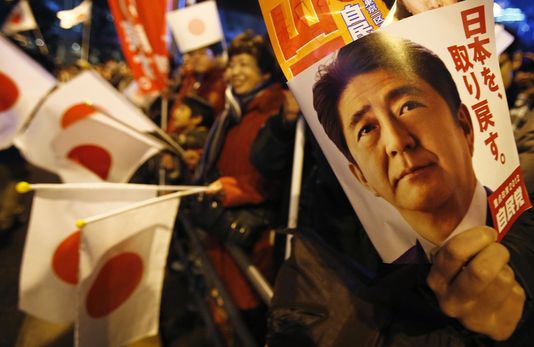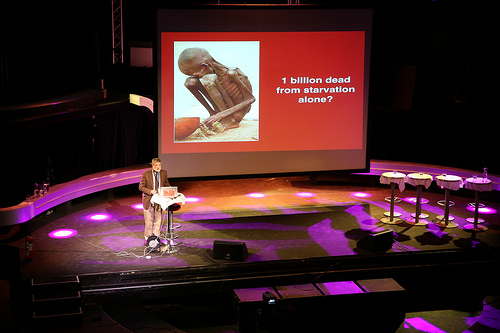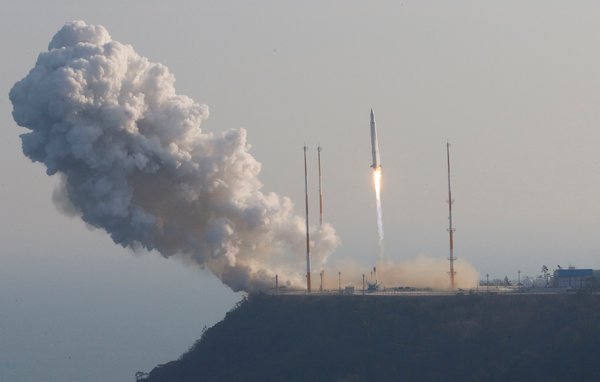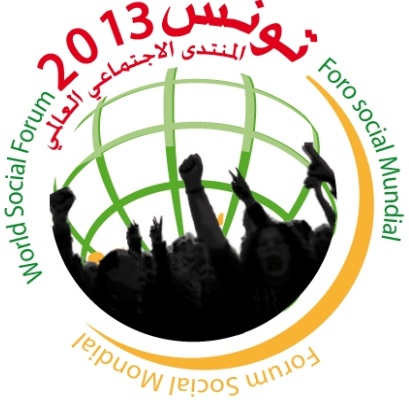
|
 |
|
|
Dear Friends and Supporters of Article 9,
We are pleased to send you our quarterly eNewsletter for January - March, 2013 with some information about the Global Article 9 Campaign to Abolish War's recent activities and related developments.
As you may have heard and will read below, the election of Abe Shinzo as Japan's Prime Minister will bring- and already has brought - a strong impact on the debate over Article 9 and more generally on Japan's constitution, as well as for the general stance that Japan holds in the international area.
|
|
|
NEWS FROM JAPAN - JAPAN'S PATH TO MILITARISM
 On December 26, key figure of Japan’s ideological conservative right Abe Shinzo was elected as Japan’s new Prime Minister. Elected on a nationalist platform, Abe won a landslide victory of the Liberal Democratic Party in the lower house of Parliament. On December 26, key figure of Japan’s ideological conservative right Abe Shinzo was elected as Japan’s new Prime Minister. Elected on a nationalist platform, Abe won a landslide victory of the Liberal Democratic Party in the lower house of Parliament.
During his first tenure as Prime Minister in 2006-2007, Abe ardently pushed for the revision of war-renouncing Article 9 of Japan’s Constitution in the name of building a “strong Japan.” His track record includes overseeing the creation of the Ministry of Defence, advocating for the re-interpretation of Article 9 to expend the mandates of Self-Defence Forces’ missions and allow collective action. Back in power, Abe is determined to push his agenda forward.
New LDP’s draft constitution
Last April, before Abe returned to power, the LDP drafted a new constitution, with the changes it would like to see adopted as part of its broader agenda "to reclaim Japanese sovereignty" by getting rid of the current constitution, which, according to Abe, fails “to provide a necessary condition for an independent nation”.
Changes proposed by the LDP’s draft constitution include: deleting "the right to live in peace, free from want and fear" granted in the current preamble; removing Article 97, which guarantees fundamental human rights and the supremacy of the constitution; increasing the Emperor’s powers; limiting the freedom of speech "for the purpose of interfering public interest and public order"; loosening the prohibition to inflict torture and inhuman treatments; revising human rights provisions to place them in the context of “the State's history, culture and tradition"; curtailing the independence of the judiciary from political control; and imposing a number of obligations on the people, such as respecting the flag and national anthem, obeying commands from the State and having obligations and compensations for freedoms and rights.
Critics are utterly concerned that the LDP draft constitution leans towards authoritarianism and would bring the country back to pre-WWII Japan. It also represents a serious setback in terms of peace and human rights. "It is very clear from this document that their world vision is detached from the more common understanding of fundamental human rights," said Lawrence Repeta, a professor of law at Meiji University.
Article 9 – Regarding Article 9 that famously “forever renounce[s] war… and the use of force as means of settling international disputes”, the LDP draft deletes the provision stating that armed “forces and other war potential shall never be maintained." Instead, the draft document sets up a “National Defense Force” under the prime minister as “commander-in-chief”. It also adds a third paragraph to Article 9(2), by which the new force is granted the mandate not only to defend the territory from a foreign attack, but also to participate in peacekeeping operations, maintain domestic public order and protect individual rights.
The LDP draft also enables the prime minister to declare a state of emergency.
Constitutional changes – On December 31, Abe told the Upper House: "I will start with amending Article 96 of the constitution, a move that many factions (inside his Liberal Democratic Party) support."
Article 96 establishes that constitutional amendments require a two-thirds majority in both houses, and must be ratified by a referendum. Under the LDP draft, a simple majority in the two houses would be sufficient to enact constitutional amendments.
Although Abe’s LDP party and its coalition partner New Komeito currently have the needed two-thirds majority in the lower house of the Diet (82% according to some estimates), they fall short of it in the upper house. Elections for half of its members will take place this coming July.
Seen as less political than revision of Japan’s peace clause and other fundamental rights, the move is however very significant, as it will open a Pandora's Box for further revisions of the constitution.
Collective Self-Defense
In parallel to constitutional reforms, Abe’s government is seeking to change the current interpretation of Japan’s peace constitution that prohibits Japan to exercise collective self-defense.
On February 8, Abe reconvened the Advisory Panel on Reconstruction of the Legal Basis for Security – a panel he set up in 2007 during his past tenure as prime minister.
The panel’s report, published in April 2008, advocated that Japan's exercise of the right to collective self-defense be allowed to defend U.S. naval vessels in the event of an armed attack on the high seas or to intercept a ballistic missile against the U.S. It also advised that Japanese Self-Defense Forces be authorized to use of weapons to defend other countries’ troops engaged in international peacekeeping operations and to provide logistical support to other countries in peacekeeping operations.
But by the time the panel published its recommendations, Abe had resigned as Prime Minister. His successors were not keen on following these recommendations, and the government never acted upon the report.
Now that he is back in office, Abe is seeking to revive the panel’s work and broaden its mandate to consider other scenarios in which Japan should be, in the view of the panel, authorized to exercise a right to collective self-defense.
Defense spending
In yet another move to strengthen Japan’s military posture, Abe has ordered the review and replacement of Japan’s five-year national defense guidelines adopted in 2010, which called for a gradual reduction in defense spending. Instead, he wants to bolster the country’s military and announced an increase of 40 billion yen ($440 million) in defense spending – the first increase in 11 years.
According to the draft budget proposed on January 27, the defense budget will rise by 0.8%, bringing defense spending on equipment, personnel and operations by Self-Defense Forces to a total of 4.68 trillion yen ($51.7 billion).
“While Japan has been cutting defense spending for the past ten years, other countries in the area have gradually been increasing their budgets. I want to ask for a budget that will make it possible for us to secure a more certain defense system,” explained Japanese Defense Minister Onodera Itsunori, commenting the draft budget. The document will have to be approved by the Diet before it takes effect in April.
In 2012, Japan’s defense budget stood at 4.65 trillion yen, or $53.3 billion, making Japan’s military budget the world’s 6th largest (with 3.6% of global military spending) and one of the largest and most advanced militaries in Asia, in spite of a tacit limit on military spending of 1% of the country’s GDP.
Japanese mobilization
A survey carried out by the Asahi Shimbun newspaper and a University of Tokyo research team shows that a short majority of voters are in favor of revising the constitution, with 45% of voters in favor of allowing Japan to exercise its right to collective self-defense. Further, according to polls, 62% of Japanese voters support the Abe Cabinet, 48% of which because of its policies (notably for his economic strategy to tackle recession). 54% of the respondents indicated they support the government's plan to increase defense spending, against just 33% who do not support it.
In this political context, many citizen’s groups are getting organized to initiate a public debate and raise awareness about the grave consequences Abe’s policies would have on Japan, the regional context and the image Japan has abroad.
On January 28, as the new Abe administration was meeting for its first Diet session, a coalition of citizens groups held an event in the Diet building. Diet members, a former president of the Japan Federation of Bar Associations, members of groups such as the Global Article 9 Campaign, the Children and Textbooks Japan Network 21, and other CSO representatives made statements opposing the revision of Article 9, changes in history textbooks that deny the role Japan played during WWII, and other policies being pushed forward by Abe.
With elections in the upper house of parliament scheduled for July 21, key Japanese peace groups, along with a large number of constituencies including religious networks, are coming together to oppose these warmongering policies and mobilize public opinion, attract media coverage and send a strong signal against this trend of militarism.
Several events are being planned, including the Global Day of Action on Military Spending (GDAMS) on April 15; a major mobilization across Japan (with Tokyo as its epicenter) on May 3 for Constitution Day, with the expected attendance by heads of political parties; a fourth edition of the Asia Inter-religious Conference on Article 9 and Peace in Asia; and last but not least, the holding of an international conference on Article 9 on October 14, 2013 in Osaka.
The Japanese peace movement is, in parallel, reaching out for support from the global peace movement.
In light of the dire political situation in Japan, the Global Article 9 Campaign invites you to renew your support for the campaign and to send messages of support for Japan’s peace constitution and against the government’s trend to nationalism and its path to militarism.
To read more on this topic:
- Japan Today: "Abe vows to change constitution, reestablish 'proud Japan'"
- South China Morning Post: "LDP charter change will return Japan to pre-war authoritarianism, critics warn"
- Asahi Shimbun: "Abe restarts discussions on collective self-defense right"
- New York Times: "Japan Is Weighing Raising Military Spending"
Picture credit: Yuriko Nakao, Reuters
|
HUMANITARIAN IMPACT OF NUCLEAR WEAPONS – OSLO MEETINGS BRING HOPE FOR ABOLITION
During the first week of March, cold and snowy Oslo hosted two historic global nuclear disarmament conferences. The series of events started with a Civil Society Forum, organized by the International Campaign to Abolish Nuclear Weapons (ICAN), and culminated with the holding of an international conference on the humanitarian impact of nuclear weapons hosted by the government of Norway.
Civil Society Forum
On March 2 and 3, in a historic display of the strength and energy of civil society, close to 500 participants from 70 countries and all continents of the world took part in the ICAN conference.
 For two days, speakers from all sectors, including NGOs, government representatives, scientists, youth, activists, religious leaders, actors and many others, exposed the devastating humanitarian and environmental consequences of nuclear weapons and built strategies on how to build a global social movement to ban those weapons. For two days, speakers from all sectors, including NGOs, government representatives, scientists, youth, activists, religious leaders, actors and many others, exposed the devastating humanitarian and environmental consequences of nuclear weapons and built strategies on how to build a global social movement to ban those weapons.
Through speeches, workshops, discussions, and side events, scientists explained how even a small exchange of nuclear bombs would throw smoke in the atmosphere and block the sun for a decade, trigger a nuclear winter, generate nuclear famine and decimate millions; nuclear victims from Japan and Kazakhstan gave testimonies; and activists looked at precedents and best practices (ranging from the processes towards the International Criminal Court and the Convention on Cluster Munitions to Obama's campaign), as well as campaigning tools and strategies to make a treaty to ban nuclear weapons a reality.
Participants felt the Civil Society Forum was a major success: intellectually, strategically, practically and politically.
One of the many achievements was the shared sense to be part of a broad movement in which each and everyone can and should contribute, including the many youth present at the meeting who were new to the field.
The event ended with the firm conviction that a new process was underway – a process that could not be reversed.
International Conference on the Humanitarian Impact of Nuclear Weapons
This impression was carried over on the following days at the Norwegian sponsored Conference on the Humanitarian Consequences of Nuclear Weapons that took place on March 4 – 5, with the participation of 127 governments (including two of the 9 nuclear weapon states – namely India and Pakistan); several UN agencies (including OCHA, UNDP and UNHCR); the International Red Cross Committee (ICRC); as well as 50 representatives from civil society coordinated by ICAN.
Notably absent were the five permanent members of the UN Security Council (the US, the UK, China, Russia and France), which decided to boycott the conference on the ground that a new process “would divert discussion and energy from practical step by step approach and non-proliferation work”.
Initially taken as a setback, their absence did not hold the rest of the world from going ahead with examining the humanitarian consequences of nuclear weapons, including discussions on creating a treaty to abolish them. "The P5 have missed an opportunity for dialogue here, but it has not stopped countries moving forward," commented ICAN’s Co-Chair, Dr Rebecca Johnson.
Indeed, this Oslo meeting was undeniably a groundbreaking event.
During the two-day gathering, diplomats, governmental officials, CSOs, UN agencies, ICRC, scientists and Hibakusha shared expert reports on medical, biological, environmental, economic and long term consequences of use of nuclear weapons. Many governments made highly positive and helpful interventions - some asking questions of expert presentations, others offering their own experiences and thoughts on the subject. ICAN, as the civil society partner of the conference, presented a video statement at the opening session as well as four oral interventions.
In its statement, the ICRC presented the result of its six-year long in-depth assessment of its own capacity, and that of other agencies, to help the victims in the event of a nuclear explosion and concluded that “an effective means of assisting a substantial portion of survivors of a nuclear detonation, while adequately protecting those delivering assistance, is not currently available at national level and not feasible at international level.”
Thus, for the very first time, governments publically admitted that they could not efficiently handle the consequences of a (even limited) nuclear explosion, neither immediately after the attack, nor in the following months or years.
They also conceded that not only were they not prepared to provide the needed protection and assistance to their citizens after a nuclear attack, but also that it was not possible to ever be prepared.
 The Foreign Minister of Norway summed up with some personal comments:
“I believe that we have succeeded in reframing the issue by introducing the humanitarian impacts and humanitarian concerns at the very centre, at the core of the discourse on nuclear weapons. Taking that approach it has become very clear that this is everybody’s concern and it is equally legitimate for nuclear states and non-nuclear states alike to care about this issue. In doing so, we believe that we are taking the debate about nuclear weapons out of the somewhat traditionalised and institutionalised arenas that are already existing. We are not intending to substitute them. This is a supplement but we do believe that there is a new sense of urgency that should govern our work in this area." The Foreign Minister of Norway summed up with some personal comments:
“I believe that we have succeeded in reframing the issue by introducing the humanitarian impacts and humanitarian concerns at the very centre, at the core of the discourse on nuclear weapons. Taking that approach it has become very clear that this is everybody’s concern and it is equally legitimate for nuclear states and non-nuclear states alike to care about this issue. In doing so, we believe that we are taking the debate about nuclear weapons out of the somewhat traditionalised and institutionalised arenas that are already existing. We are not intending to substitute them. This is a supplement but we do believe that there is a new sense of urgency that should govern our work in this area."
Indeed, there was a common understanding among all those present that the current debate on nuclear disarmament is not satisfactory in the framework of the Non-Proliferation Treaty and other UN avenues where negotiations have been stalled, and that new channels and initiatives are needed.
In light of the interest expressed by many governments to further explore the issue and continue the discussions started in Oslo, and based on their common view that understanding of the global humanitarian consequences of nuclear detonations should be the starting point for urgent action to ban and eliminate nuclear weapons, Mexico announced it would host a follow-up meeting to this conference.
Unique in its positive, interested and engaged atmosphere, the conference thus ended by opening a new political process - and new concrete hopes that nuclear weapons can be abolished.
More information about the conference, including videos and statements, can be found here.
Visit the ICAN Civil Society Forum website here.
Pictures credit: Alexander Harang, ICAN and Mari Nordmo, Norwegian Ministry of Foreign Affairs
|
NORTHEAST ASIA - NORTH AND SOUTH KOREA SHOULD START DIALOGUE IMMEDIATELY, THE ONLY FUNDAMENTAL SOLUTION
 On January 23, 2013, following the rocket launch by the DPRK of December 12, 2012 and the adoption of Resolution 2087 by the UN Security Council that condemns the launch and tightens the sanctions against the country on January 22, 2013, the People’s Solidarity for Participatory Democracy (PSPD) issued a statement requesting that “North Korea refrains from rocket launch and that South Korea and the international society not respond only with sanctions against North Korea.” On January 23, 2013, following the rocket launch by the DPRK of December 12, 2012 and the adoption of Resolution 2087 by the UN Security Council that condemns the launch and tightens the sanctions against the country on January 22, 2013, the People’s Solidarity for Participatory Democracy (PSPD) issued a statement requesting that “North Korea refrains from rocket launch and that South Korea and the international society not respond only with sanctions against North Korea.”
The statement called for a “careful and peaceful problem solving approach”, emphasizing that “[d]ialogue is the only fundamental solution. North and South Korea, and the international society must immediately start dialogue.”
North Korea has since conducted yet another nuclear test on February 12, 2013 – the third in seven years – and the UN Security Council once again tightened its sanctions against Pyongyang on March 7, 2013, thus further intensifying the conflict around North Korea nuclear program and exacerbating tensions in the region.
In its January statement, PSPD expressed its concerns “with repeated decisions that do not contribute to maintaining peace and denuclearization in the Korean peninsula.”
Read PSPD’s statement of January 23, 2013 here.
Also read PSPD's statement of Februray 12, 2013 condemning North Korea's Nuclear Test here. |
ANNOUNCEMENT - ARTICLE 9 AT THE WORLD SOCIAL FORUM

On March 27, Peace Boat and JALISA, in cooperation with El Taller International, will be holding, on behalf of the Global Article 9 Campaign, a session on Article 9 as part of the World Social Forum that will take place in Tunis on March 26-30, 2013.
Entitled "Save Japan’s Peace Constitution! – Article 9, its global scope and its relevance for the Arab Spring and the Middle East", the event will give an insight on the challenges posed to Article 9 at the Japanese level and highlight the importance and relevance peace constitutions have as international peace mechanisms.
In the wake of the Arab Spring that has produced revolutionary changes of the political systems in Northern Africa and the Middle East, a debate on the role that peace clauses have in promoting peace, democracy, disarmament and human security could have a positive impact on countries that are faced with the opportunity to remodel their constitution.
In the current political context in Japan, the Global Article 9 Campaign wants to mobilize international CSOs to help to save Article 9 of the Japanese Constitution, campaign for peace clauses to be included in the constitution of other countries and preserve peace in Northeast Asia and in the world. It will also seek to create a fruitful dialogue among participants on possible new legal and political avenues to achieve a global peace that does not rely on force.
Panelists will include Mr. Hiroshi Miyasaka, Secretary General of JALISA, Ms. Jasna Bastic, International Coordinator at Peace Boat, and Prof. Sadok Belaid, Chancellor of the University of Law, Tunis. A group of Tunisian lawyers from the Lawyer Association in Tunis and a delegation from JALISA (Japan) will take part in the 90-minute dialogue session.
Read the meeting's concept note here.
For more information about the World Social Forum 2013 in Tunis, visit the WSF website here.
|
DISARMAMENT FOR DEVELOPMENT - 3rd GLOBAL DAY OF ACTION ON MILITARY SPENDING
 On April 15, 2013, the third Global Day of Action on Military Spending (GDAMS) will be held. On April 15, 2013, the third Global Day of Action on Military Spending (GDAMS) will be held.
In 2011, global military spending surged to US $1.74 trillion. Given the numerous crises facing the planet — economic, environmental, health, diplomatic — it is imperative to create a global movement to shift this money to human needs. Yet, the world’s governments are spending more than ever on the military.
Last year, on GDAMS day, people from all continents came together to organize nearly 140 actions in 43 countries to get public, political, and media attention on the costs of military spending and call for new priorities, namely reduce military spending and focus on financing essential human needs: prevent deadly conflicts, confronting climate change, achieving the Millennium Development Goals, etc.
April 15 coincides with the release of the Stockholm International Peace Research Institute’s (SIPRI) annual figures on world military expenditures. It is also Tax Day in the US and in the Philippines. In Japan, the date comes less than a month before celebrations for the anniversary of the Constitution (May 3), which in the current context, promise to raise the issue of Japan’s deplorable path to militarization.
While each location will craft its own approach, all actions will have a common focus on calling attention to the overall size of global military spending and reaching out to different sectors, including labor, religious, social justice, development, youth… as well as policy-makers, will strengthen and multiply the impact of GDAMS.
The Global Article 9 Campaign invites you to actively participate in the 2013 GDAMS.
GDAMS is being coordin ated by the International Peace Bureau (IPB).
For more information, visit GDAMS website. |
IN MEMORIAM: BEATE SIROTA GORDON (1923-2012)
 The Global Article 9 Campaign mourns the recent passing of Beate Sirota Gordon. The Global Article 9 Campaign mourns the recent passing of Beate Sirota Gordon.
Beate Sirota Gordon played a central role in the drafting of the Japanese constitution, in particular the dispositions that grant legal equality between men and women in Japan.
Born in 1923 in Austria from a Jewish Russian family, Beate Sirota Gordon and her parents emigrated to Japan where she spent ten years of her childhood. Her family later sent her to the US to study, where she obtained US citizenship.
Fluent in Japanese, she worked during World War II for the US Foreign Broadcast Intelligence Service, the Office of War Information and Time magazine. When the war ended, she returned to Japan and served as a translator for Supreme Commander of the Allied Powers, General Douglas MacArthur. In 1946, at the age of 22, she was assigned to the subcommittee dedicated to writing Japan’s new constitution’s section devoted to civil rights and played, as the only women in the room, a significant role in drafting Article 24 that reads:
Article 24: Marriage shall be based only on the mutual consent of both sexes and it shall be maintained through mutual cooperation with the equal rights of husband and wife as a basis.
With regard to choice of spouse, property rights, inheritance, choice of domicile, divorce and other matters pertaining to marriage and the family, laws shall be enacted from the standpoint of individual dignity and the essential equality of the sexes.
After her return to the US in 1947, she continued to play a large part in Japanese-American cultural relations and remained a strong advocate for Human Rights and Peace.
A fervent supporter of Japan’s war-renouncing clause, Beate Sirota Gordon was one of the keynote speakers of the 2008 Global Article 9 Conference to Abolish War and belonged to the Article 9 Association. According to her daughter who spoke to Kyodo News, her last public statement was to oppose the amendment of Japan’s “peace clause (Article 9) and the women's rights sections of the Japanese constitution."
Read more about Beate Sirota Gordon’s contribution to women’s right and peace here.
Picture credit: Mark Stern, The Jewish Daily Forward
GPPAC: PEACE GALLERY CHALLENGE

The Global Partnership for the Prevention of Armed Conflict is launching a new contest: the Peace Gallery Challenge!
This is an online art contest looking for artwork telling a story of peace, which is being organised by GPPAC together with the support of the Municipality of the Hague, where its Global Secretariat is located. This is as part of celebrations for the 100 years of the Peace Palace.
The artworks can be photos, paintings or graphic design, showing a personal experience with peace, someone who inspires peace, an act showing peace, or an ideal peaceful situation.
The competition is open to everyone, with a deadline for artwork submission of 10 April 2013.
5 winners will be selected, and their artwork will be displayed in a large exhibition in The Hague from August until September, celebrating the 100 years of Peace Palace.
This online contest is managed by GPPAC, a global network of civil society active in conflict prevention and peacebuilding across the world, facilitated on the Peace Portal.
Please see this link for more information and share with anyone in your networks who might be interested!
|
|
Thank you for your interest in and support for the Global Article 9 Campaign to Abolish War.
Peace,
The Article 9 Team
|
|
|
|
|
| ©2008
GPPAC JAPAN All Rights Reserved. |
|